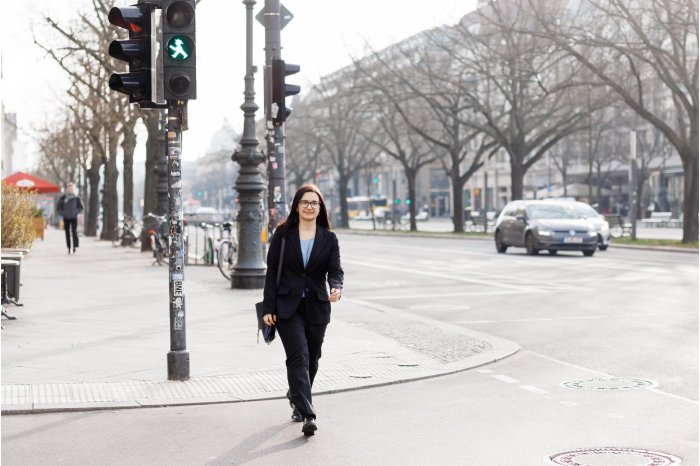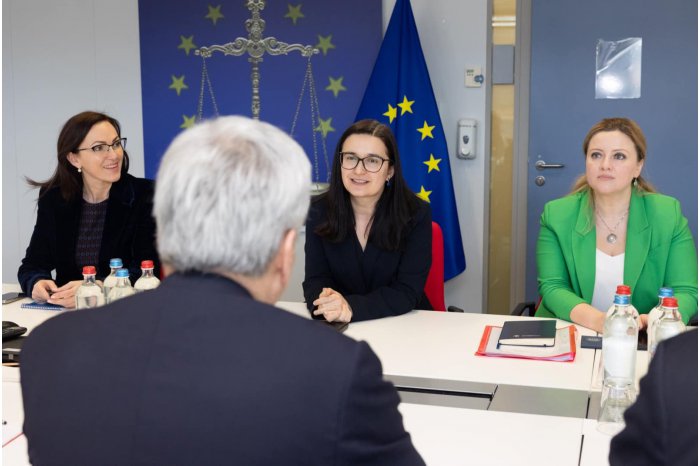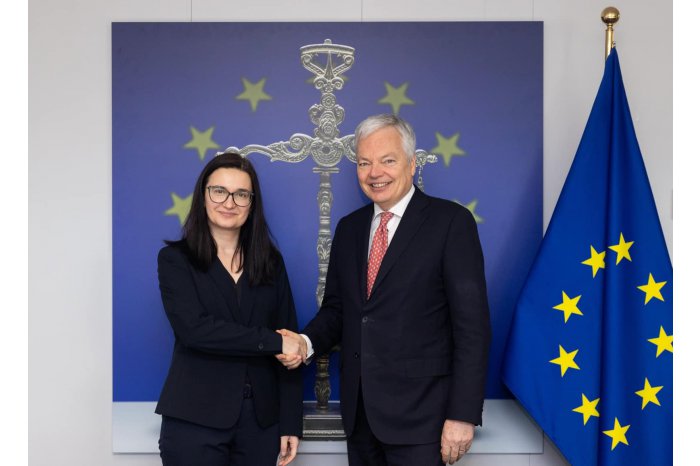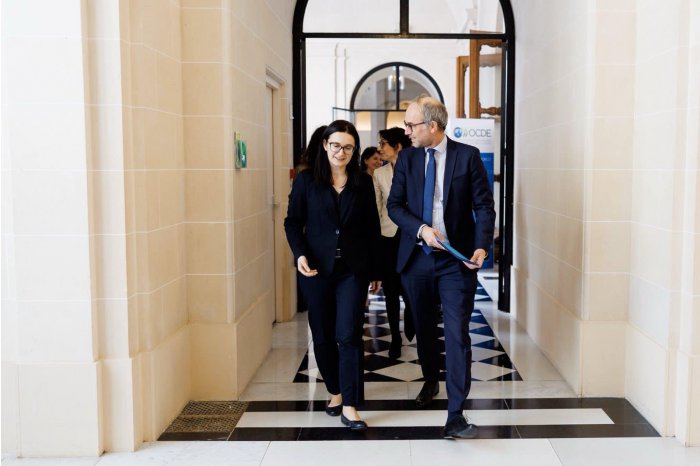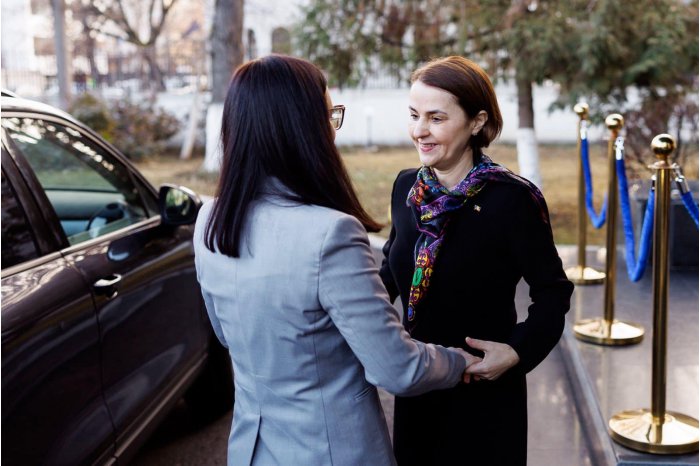EUROPEAN MOLDOVA // Deputy Prime Minister for European Integration: Situation in region making us speed up processes in order to be ready to join EU as soon as possible
17:37 | 03.05.2024 Category: Interview, Event
*Moldova applied for EU membership on 3 March 2022
*Moldova was granted EU candidate status on 23 June 2022
*On 14 December 2023, the European Council decided to open accession negotiations with Moldova
*Moldova undergoing assessment of the alignment of national legislation with European Union law, a first step for our state’s accession to the EU
*Authorities aim for Moldova to join the EU by 2030
Interview given to MOLDPRES State News Agency by Deputy Prime Minister for European Integration, Cristina Gherasimov
MOLDPRES: Madam Deputy Prime Minister, the European Council voted on 14 December 2023 to open EU accession negotiations. Following this decision, Moldova is actively involved in evaluating alignment of national legislation with the EU regulatory framework. In which areas are there the biggest discrepancies and what are the tools needed to eliminate the inconsistencies? What are the main steps in the screening process?
Cristina Gherasimov: Since February 2024, we are in the explanatory screening stage. In fact, European Commission experts present the main provisions of EU legislation - the well-known acquis communautaire - to officials of our institutions and answer questions on clarifying certain aspects of European regulations and standards. Thus, subsequently, we know exactly what we need to do to transpose them into national law. At the same time, through this exercise, we are preparing for the next stage – the bilateral screening. Only then will we be up to the task of presenting, chapter by chapter, an assessment of the current level of alignment of national legislation with that of the EU and identifying potential discrepancies. Throughout this path, we are fully supported by our colleagues in Brussels, and this autumn the 2024 Enlargement Package will be published, which will cover the Commission's main recommendations on the steps we need to take for each chapter.
As for internal instruments, we have the National Action Plan for Moldova’s accession to EU for 2024-2027, which sets out the concrete measures, the responsible institutions and the deadlines by which we plan to achieve the steps seen in the Plan. The Bureau for European Integration monitors how we are progressing in this respect.
MOLDPRES: After the screening stage, the European Council will adopt the negotiating framework. According to European officials, Brussels will make every effort to finalise the negotiating framework by 1 July this year. What does this document include and what could be the timeline for its implementation?
Cristina Gherasimov: The negotiating framework sets out the direction and principles for accession negotiations with each candidate country. The European Commission has already prepared a draft negotiating framework, member states will adopt it and the Council Presidency will present it to the Chisinau Government to officially start the accession negotiations. Therefore, the negotiating framework is the basis for us to be able to start the negotiations for each chapter. De facto, however, they can only begin once the Commission has submitted the evaluation reports for each chapter at the end of the bilateral screening process. In the past, for other candidate countries, this has taken 12-18 months. I hope that in our case this procedure will be faster and that we will be able to open the first chapters early next year.
MOLDPRES: The authorities in Chisinau want to organize the first Intergovernmental Conference to mark the official launch of EU accession negotiations as soon as possible. When will the conference be held and in what format? What important decisions are expected to be taken?
Cristina Gherasimov: Accession negotiations are conducted at intergovernmental conferences between EU member states on the one hand and the candidate country on the other. The first Intergovernmental Conference is an important political milestone, as it represents the official start of the negotiations with the European Union. At the same time, it is a good platform to exchange positions between the EU and the candidate country, to present the negotiating team and propose the agenda of meetings in the screening process preceding the negotiations. We hope that this first Intergovernmental Conference - which will be attended by representatives of EU member states as well as of the Government in Chisinau - will be held in the near future. Its goal is the adoption of the negotiating framework, which will allow us to start discussions on each individual chapter. At the same time, the Republic of Moldova will submit its overall negotiating position, which is de facto the Country Declaration - a political document approving the negotiating framework.
MOLDPRES: To what extent could the security situation in the region, caused by the war waged for over two years by the Russian Federation against Ukraine and the crises caused by it, hinder Moldova's EU integration process?
Cristina Gherasimov: I think that, on the contrary, the situation in the region is making us speed up the processes in order to be ready to join the European Union as soon as possible. Just as we managed to achieve candidate country status and almost fully meet the nine recommendations of the European Commission in order to start negotiations, just as - despite the difficult economic, social and security context - the EU member states decided in December 2023 to launch accession negotiations, we will also manage from now on to progress on our European path. This is the only way to avoid crises like the ones we are currently experiencing in the future.
MOLDPRES: Moldovan citizens are expected to take part in a referendum on the country's European integration this autumn. The authorities thus aim to set the strategic goal of European integration in the Constitution. What are your arguments to convince people that EU integration is the right choice for our future?
Cristina Gherasimov: We only have to look at the countries that joined the European Union after 2000 to understand why this is the best way for Moldova. By the way, 1 May marks the 20th anniversary of the biggest enlargement of the European Union, when the EU family increased by ten member states. Our fellow citizens who - either out of stubbornness or ignorance - refuse to see how much these countries have developed for the better, economically and socially, are simply lying to themselves and to others. Yet, these countries have experienced real leaps in development. I am confident that as in Romania or Poland, Lithuania or Czechia, as well as in the other countries that have joined the EU in the last 20 years, European integration will also bring us economic growth and development opportunities. This means more investment and more business instruments for companies in our country, and therefore the perspective of well-paid jobs and additional budget revenues. And if there is money in the budget, higher pensions, child benefits or social allowances can be paid. New member states also get financial support to develop their infrastructure - new roads, modern schools and hospitals at the highest standards. European integration will ensure the primacy of the law. We will thus be able to get rid of the toxic influence of those who want to steal the country's money and resources and who believe that they can still go unpunished. And last but not least, EU membership will bring us long-term peace and security, which we all want.
Thank you for the interview!
Reporter: Ala Ciobanu
